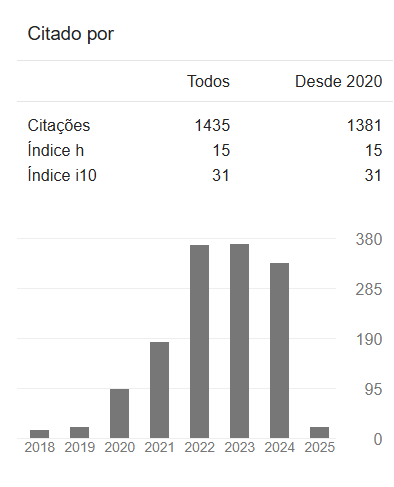OF CONVERSATIONS VILLAGE STARTED NIGHTS TO THE CLASSROOM: INDIGENOUS ORAL LITERATURE AS A SOURCE FOR CONSTRUCTION OF MATERIALS AND METHODS SUITABLE FOR INDIGENOUS SCHOOLS
DOI:
10.23926/RPD.2526-2149.2019.v4.n2.p546-558.id520Keywords:
Indigenous School Education, Interculturality, Indigenous Oral LiteratureAbstract
This paper aims to qualitatively analyze, considering the theoretical framework of Munduruku (2014), Cascudo (2006), and the National Curriculum References for Indigenous Schools, the results of a workshop held in 2018 with indigenous and non-indigenous teachers working in villages. Guajajara and Canela Ramkokamekrá, which proposed the production of differentiated material and the qualification of teachers for the adoption of methodologies that respected the learning processes of each community. Analyzes indicate that the school has helped to crystallize inaccurate perceptions about literature and writing as it discredits orality. On the other hand, it was also observed that the methodological proposals and materials built throughout the workshop offer possible ways in which indigenous school education can tread to ensure an intercultural, diverse and differentiated curriculum.
Downloads
Metrics
No metrics found.
References
BRASIL. Constituição da República Federativa do Brasil de 1988. Disponível em: http://www.planalto.gov.br/ccivil_03/constituicao/constituicao.htm. Acesso em: 10/08/2019.
BRASIL. Decreto nº 8.072, de 20 julho de 1910. Disponível em: http://planalto.gov.br/ccivil_03/decreto/1910-1929/D8072.htm. Acesso em: 10/08/2019.
BRASIL. Lei de Diretrizes e Bases da Educação Nacional de 1996. Disponível em: http://www.planalto.gov.br/ccivil_03/leis/l9394.htm. Acesso em: 12/08/2019.
BRASIL. Parâmetros Curriculares Nacionais – Ensino Médio. Ministério da Educação, 2000. Disponível em: http://portal.mec.gov.br/seb/arquivos/pdf/blegais.pdf Acesso em: 12/08/2019.
BRASIL. Referencial Curricular Nacional para as Escolas Indígenas. Ministério da Educação/Secretaria de Educação Fundamental. - Brasília: MEC/SEF, 1998.
CASCUDO, Luís da Câmara. Literatura Oral no Brasil. 2.ed. São Paulo: Global, 2006.
FAZENDA, Ivani Catarina Arantes. Integração e interdisciplinaridade no ensino brasileiro: efetividade ou ideologia. 6 ed. São Paulo: Edições Loyola, 2011.
FUNDO NACIONAL DE DESENVOLVIMENTO DA EDUCAÇÃO. Saberes indígenas na escola. Disponível em: http://www.fnde.gov.br/programas/bolsas-e-auxilios/eixos-de-atuacao/lista-de-programas/item/6439-saberes-indigenas-na-escola Acesso em: 17/08/2019.
KLEIMAN, Ângela. Os significados do letramento: uma nova perspectiva sobre a prática social da escrita. Campinas, SP: Mercado das Letras, 1995
MARCUSCHI, Luiz Antônio. Fala e escrita. Orgs. Luiz Antônio Marcuschi e Angela Paiva Dionisio.1. ed., 1. reimp. — Belo Horizonte: Autêntica, 2007.
MINDLIN, Betty. O fogo e as chamas dos mitos. Estudos Avançados, São Paulo, vol. 16, n. 44, p. 149 – 169, 2002. Disponível em: http://www.revistas.usp.br/eav/issue/view/733 Acesso em 18/08/2019. DOI: https://doi.org/10.1590/S0103-40142002000100009
MINISTÉRIO DA EDUCAÇÃO. MEC trabalha por avanços na educação escolar indígena. 2019. Disponível em: http://portal.mec.gov.br/busca-geral/206-noticias/1084311476/75261-mec-trabalha-por-avancos-na-educacao-escolar-indigena. Acesso em: 15/08/2019.
MUNDURUKU, Daniel. O caráter educativo do movimento indígena brasileiro (1970 – 1990). São Paulo: Paulinas, 2012.
MUNDURUKU, Daniel. Literatura indígena e as novas tecnologias da memória. In: BELMIRO, Cecilia et. al. (Orgs.). Onde está a literatura? Seus espaços, seus leitores, seus textos, suas leituras. Belo Horizonte, MG: Editora UFMG, 2014. p.169 – 179.
PACHECO DE OLIVEIRA, João.; FREIRE, Carlos Augusto da Rocha. A presença indígena na formação do Brasil. Brasília: Ministério da Educação, Secretaria de Educação Continuada, Alfabetização e Diversidade; LACED/Museu Nacional, 2006. Disponível em: http://www.dominiopublico.gov.br/download/texto/me004372.pdf Acesso em 15/08/2019
PALADINO, Mariana. História e historiografia indígena. In: AMORIM, Claudia; PALADINO, Mariana. Cultura e Literatura Africana e Indígena. Curitiba: IESDE Brasil S.A., 2010, p. 101 – 121.
ZAPPONE, Mirian Hisae Yaegashi e YAMAKAWA, Ibrahim Alisson. Letramento dominante x vernacular e suas implicações para o ensino da literatura. Muitas Vozes, Ponta Grossa, vol. 2, n.2, p. 185 – 198, 2013, DOI: 10.5212/MuitasVozes.v.2i2.0002. Disponível em: www.revistas2.uepg.br/index.php/muitasvozes/article/download/6126/pdf_141 Acesso em: 10/06/2019. DOI: https://doi.org/10.5212/MuitasVozes.v.2i2.0002
Downloads
Published
How to Cite
Issue
Section
License
Copyright (c) 2023 A Revista Prática Docente tem o direito de primeira publicação

This work is licensed under a Creative Commons Attribution-NonCommercial 4.0 International License.
Authors who publish in this journal agree to the following terms:
- Authors retain the copyright and grant the journal the right of first publication, with the paper simultaneously licensed under the Licença Creative Commons Attribution allows the sharing of the work with acknowledgment of authorship and initial publication in this journal.
- Authors are authorized to take additional contracts separately, for non-exclusive distribution of the version of the work published in this journal (e.g. publish in institutional repository or as a book chapter), with acknowledgment of authorship and initial publication in this journal.











